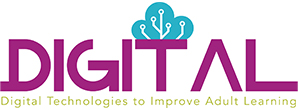 Approximately 90% of jobs today require some level of digital skills and both the Council Resolution on a Renewed European Agenda for Adult Learning (2011) and the Upskilling Pathways Initiative (2016) recommend adult education provision is strengthened to improve the digital skills of many millions of low-skilled or low-qualified adults who are most vulnerable in the labour market.
Approximately 90% of jobs today require some level of digital skills and both the Council Resolution on a Renewed European Agenda for Adult Learning (2011) and the Upskilling Pathways Initiative (2016) recommend adult education provision is strengthened to improve the digital skills of many millions of low-skilled or low-qualified adults who are most vulnerable in the labour market.
However, the integration of digital tools into adult education is lagging behind in France and our partner countries. France and Germany’s digital learning environment for adult education was characterized as “tentative” (and Greece “traditional”) by a 2015 Ecorys/Bertelsmann report which also noted that the most important driver of integrating digital technologies is teachers’ own digital abilities and confidence (EC, Adult Learners in Digital Learning Environments 2015). In addition, even educators who are keen to use digital teaching face such a large number of digital and cloud based educational tools, platforms and learning environments that it can be difficult to know where to start.
 Therefore, DIGITAL has a clear objective: increase the ability and motivation of educators working with low-skilled, low-qualified adults to use digital learning strategies and tools in order to make learning more attractive, relevant and boost their professional and personal development. We will pursue this aim by following these specific objectives:
Therefore, DIGITAL has a clear objective: increase the ability and motivation of educators working with low-skilled, low-qualified adults to use digital learning strategies and tools in order to make learning more attractive, relevant and boost their professional and personal development. We will pursue this aim by following these specific objectives:
- O1: Good Practice Compendium. A digital publication that encourages knowledge sharing and peer learning among Adult Education organizations and stakeholders by identifying and sharing leading innovative approaches in using digital teaching for adults, with a special focus on disadvantaged and marginalised adults and NEETs.
- O2: DIGITAL Toolbox. An interactive publication featuring the 20 best digital learning resources, tested and tried by our team, with practical guidance on how to use them.
- O3: DIGITAL Online Learning Course. A course that adult education teachers can use to strengthen their own digital skills. Uniquely, each module of the course will be taught using a different platform, thus integrating learning outcomes with the delivery mechanism.
 The intended impact DIGITAL hopes to have on the target group is to improve the skills and attitudes of adult educators to increase the use of digital tools we will impact not only the effectiveness of training to individual trainees and groups, but be able to create waves of change regarding the use of digital technology in adult education as a whole.
The intended impact DIGITAL hopes to have on the target group is to improve the skills and attitudes of adult educators to increase the use of digital tools we will impact not only the effectiveness of training to individual trainees and groups, but be able to create waves of change regarding the use of digital technology in adult education as a whole.
At national level the project will impact on the adult education by showing how it can and must adjust to harness the power of digital technology, or risk failing itself and its trainees and clients. While at an international level, the project will impact positively on the ongoing work of EU bodies to develop robust yet practical frameworks for competence development and to close the digital skills gap.



